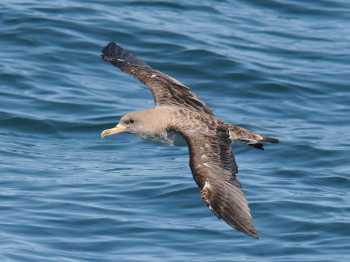Graham Fairhurst (Department of Biology, University of Saskatchewan, Saskatoon, Canada) and colleagues writing on-line in the journal Proceedings of the Royal Society Biological Sciences, have measured corticosterone levels in chicks of Cory's Shearwater Calonectris diomedea, a potential candidate species for ACAP-listing, to study aspects of sex-specific parental investment.
The paper's abstract follows:
"Offspring of long-lived species should face costs of parental trade-offs that vary with overall energetic demands encountered by parents during breeding. If sex differences exist in how parents make the trade-off, sex-specific differences may exist in the contribution of each parent to those costs. Adaptations of offspring facing such costs are not well understood, but the hormone corticosterone probably plays a role. We manipulated breeding effort in Cory's shearwaters (Calonectris diomedea) to increase costs to offspring and used an integrated measure of corticosterone from chick feathers to investigate how experimental variation in parental investment influences offspring physiology. Average foraging trip duration and foraging efficiency (FE) of breeding pairs were not related to chick corticosterone, but sex biases in FE were. Adult male investment was more strongly related to chick corticosterone than was female investment. Importantly, we show for the first time suppression of adrenocortical activity in nestling Procellariiform seabirds, and explain how our results indicate an adaptive mechanism invoked by chicks facing increased costs of parental trade-offs."

Cory's Shearwater off South Africa. Photograph by John Graham
Reference:
Fairhurst, G.D., Navarro, J., González-Solis, J., Marchant, T.A. & Bortolotti, G.R. 2011. Feather corticosterone of a nestling seabird reveals consequences of sex-specific parental investment. Proceedings of the Royal Society Biological Sciences. doi: 10.1098/rspb.2011.0884.
John Cooper, ACAP Information Officer, 31 October 2011

 English
English  Français
Français  Español
Español